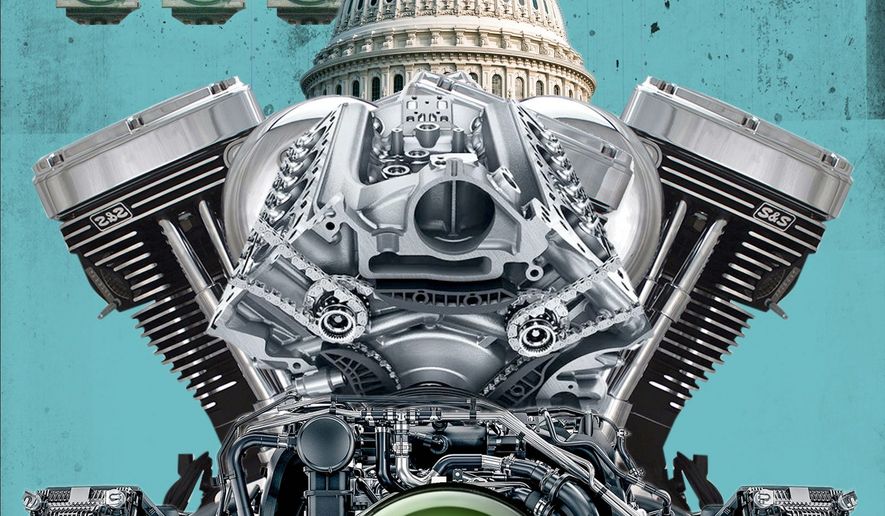OPINION:
Eventually, America must get back to work. How well we all practice the current health guidelines from the Centers for Disease Control and Prevention (CDC) will determine how quickly we can restart the economy. We must all do our part.
While our collective priority must be on the health and safety of our fellow citizens, there should be a parallel effort taking place right now to prepare for the reignition of our nation’s economic engine. We must not wait to start the work to fix our economy the day after we win the war on the coronavirus and simply expect everything to go back to normal. We can prepare a plan to restore the health of the American economy while acting to protect the health of our fellow citizens.
In January, President Trump wisely created a White House Coronavirus Task Force. Now, we need a White House Task Force to Restart the American Economy.
The president should appoint members immediately. The task force should include small business and industry leaders from a variety of backgrounds, workforce development expert, and officials from local, state and federal government, including leaders from both major political parties.
One of the first items this task force must address is reforming the unemployment system. Since the government took steps to shut down major portions of the economy, it makes sense that impacted workers should receive reasonable compensation for lost wages. We know that we must quickly provide assistance to workers so that they and their families can pay the rent or mortgage and other bills.
In addition, the Coronavirus Aid, Relief, and Economic Security Act (CARES Act) provides additional assistance for those who are now unemployed. Specifically, eligible individuals receive an additional $600 weekly payment that will end after payments for the last week of unemployment before July 31, 2020.
Once we win the war against the coronavirus, we will need a capable workforce to restart the economy. Yet, many people will be making more money through unemployment benefits than if they returned to their previous employment.
A full-time worker making $10 per hour normally makes $400 each week. If unemployed, that person would receive $208 each week in Wisconsin. Now add the new federal enhanced unemployment benefit ($600) and you get $808 per week. How do we get that person to consider going back to work when they will make more than twice what they did at their job?
The answer is simple. Give them an incentive to get back to work. Here is an idea: Let them bring home $100 more each week through a combination of their wages and a portion of the enhanced unemployment benefit than they would if they stayed on unemployment through July 31, 2020.
This new idea lets them go back to work making $400 per week and provides them with an employment incentive from the federal government of $508 each week through July 31. The total take-home pay for that worker adds up to $908 ($100 more than if they took the state and federal enhanced unemployment benefits). It is a win-win as people have an incentive to go back to work and taxpayers save money.
We explored a similar idea in Wisconsin with other government benefits during my time as governor. For years, many people receiving public assistance — typically related to health care — were reluctant to take additional hours or higher-paying jobs if they lost their assistance. We called it a “benefits cliff” because recipients would earn a specific amount and then lose all of their benefits - kind of like falling off of a cliff.
Our reforms allowed people to transition off of assistance as they earned more from employment. In turn, we removed a major disincentive to work. Ideas like this are good public policy and are philosophically sound. But more importantly, for this time in history, they are practical. We can provide assistance for our fellow citizens while motivating them to return to the workforce.
When we are successful, we can rename the Federal Pandemic Unemployment Compensation program to the Federal Pandemic Employment Incentive program. I call it common sense.
Turning the enhanced unemployment benefits into an incentive to work is one of the many issues that should be reviewed by a White House Task Force to Restart the American Economy. So let’s get going.
Members of the task force need to focus on positive reforms that help people get back to work. That means appointing small business, industry, workforce development and public sector leaders with experience as innovators. We need to find new and creative ways to break down the barriers to employment.
Defeating the coronavirus will take a wide range of experts and the assistance of the American people. The same will be true as we successfully restart the American economy and put our people back to work. We can do it.
• Scott Walker was the 45th governor of Wisconsin. You can contact him at swalker@washingtontimes.com or follow him @ScottWalker.




Please read our comment policy before commenting.